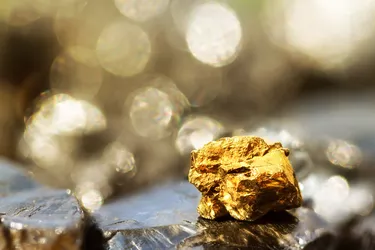
The lure of prospecting for gold still resonates with many people, long after the famed California and Alaska gold rushes are just a memory. The Georgia and North Carolina gold rushes, both of which pre-date the California gold craze, represent southern states that experienced "gold fever" in the 1800s. But raw gold isn't limited to discoveries in these states; you'll find it in almost every state. If you have some raw gold, you'll be able to sell it in a number of places, depending on how much you have and where you live.
Make Sure It's Real Gold
Video of the Day
Before you search for where to sell raw gold, know that not all rocks with gold in them are true gold. Other metallic minerals can mimic the look of real gold, notably pyrite, which is commonly called "fool's gold." If you're a novice and can't tell the difference, find a local gold assayer in your area who can test for authenticity. A gem and mineral show will have assayers on hand for this purpose.
Video of the Day
Raw Gold Properties
Because raw gold is unrefined, it's impure. Refining rids it of the impurities, so don't be disappointed if your raw gold doesn't fetch the premium price that you expect for pure gold. Placer gold is raw gold you find, for example, as flakes or nuggets in stream beds or on the ground, compared to lode gold, which are the embedded veins of gold that must be extracted from rock outcroppings. Your raw gold is likely placer gold, which is typically only 60 to 85 percent pure.
Where to Sell Raw Gold
There are a multitude of raw gold businesses and individual sellers. Choose the option that meets your comfort level and gives you the best price for your raw gold.
- Local gold buyers. An online search for local gold dealers and gold buyers will turn up options close to where you live. You may want to research a potential gold buyer to make sure it's a legitimate and trustworthy business. If the buyer is a pawn shop business, shop around for other buyers to make sure you're getting the best price for your raw gold.
- Rock, gem and mineral trade shows. Search online for trade show dates and venues near you. Vendors have exhibits at these shows, but you'll also find numerous raw gold buyers at a show.
- Online auctions and marketplaces. You'll find lots of online auctions and marketplaces where you can sell your raw gold. Be prepared to pay various fees, including listing fees and final value selling fees. To make sure you get a fair price, set a reserve price on your auction. That way, if bidders do not reach your minimum selling price, you will not be required to sell your raw gold.
- Cash-for-gold businesses. These companies typically ask you to send your raw gold to them so they can make an assessment of its purity and give you a price for selling it. Although there are reputable cash-for-gold companies, before you mail raw gold to any of them, check them out. For example, SellYourGold.com was rated as the premier cash-for-gold business by NBC's Today Show.
- Prospecting clubs. You may find a local prospecting club that has members who buy and sell raw gold. A simple online search can help you find a group.
Raw Gold Prices
The price of raw gold fluctuates, depending on the market, and it may vary among buyers. Raw gold nuggets are measured in grain units, with 1 grain equaling 0.002083333 troy ounces, and it takes 15.5 grains to equal 1 gram. As of the date of publication, 1 grain of raw gold is worth $2.79.